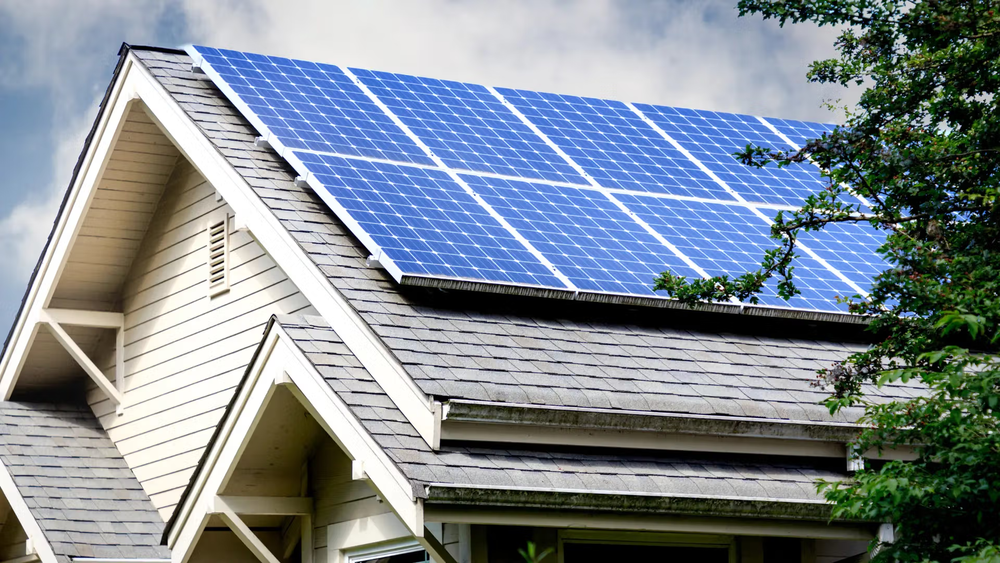In an era marked by a growing consciousness towards sustainable living, the integration of solar panels into residential heating, ventilation, and air conditioning (HVAC) systems stands out as a beacon of clean and renewable energy. Harnessing solar power not only reduces carbon footprints but also provides a cost-effective alternative to traditional energy sources. This blog post explores the myriad benefits of harnessing solar power for your home, and provides practical considerations before investing in a solar power system for your home.
Benefits of Solar Panels in Residential HVAC Systems
Cost Savings
One of the most significant benefits of solar panels is the potential for substantial cost savings on your energy bills. By generating your own electricity, you can reduce or even eliminate your dependence on the traditional power grid. Over time, the initial investment in solar panels pays off as you enjoy lower monthly energy costs.
Environmental Impact
Solar panels are a clean and renewable energy source, producing electricity without emitting harmful pollutants. Choosing solar power for your HVAC system significantly reduces your carbon footprint, contributing to the global effort to combat climate change. This environmentally friendly option aligns with the growing emphasis on sustainable living.
Energy Independence
Solar panels empower homeowners with a sense of energy independence. Rather than relying solely on external power sources, you become a producer of your own energy. This is especially valuable during peak energy demand periods or in the event of power outages, providing a reliable and continuous power supply for your HVAC system.
Increased Property Value
Homes equipped with solar panels often see an increase in property value. Potential buyers are increasingly recognizing the long-term cost savings and environmental benefits associated with solar energy, making solar-equipped homes more attractive in the real estate market.
Government Incentives
Governments around the U.S. offer various incentives to encourage the adoption of solar technology. These incentives may include tax credits, rebates, and other financial perks that can significantly offset the initial cost of installing solar panels. Researching and taking advantage of these programs can make solar energy even more economically appealing.
Low Maintenance Requirements
Solar panels are known for their durability and low maintenance requirements. With no moving parts, the risk of mechanical failure is minimal. Routine cleaning and occasional checks for debris or shading are typically all that’s needed to ensure optimal performance.
Long-Term Investment
While the initial installation cost of solar panels may seem significant, it’s crucial to view it as a long-term investment. Over the lifespan of the system, homeowners can recoup their initial investment through energy savings and various incentives, making solar panels a financially sound decision.
Considerations Before Investing in Solar Panels
Energy Consumption Assessment
Before diving into solar panel installation, conduct a thorough assessment of your home’s energy consumption patterns. Understand the energy needs of your HVAC system, appliances, and other electrical devices to determine the appropriate size and capacity for your solar panel system.
Local Climate and Sunlight Availability
Solar panels depend on sunlight to generate electricity. Assess the local climate and sunlight availability in your area. While solar panels can still be effective in regions with occasional cloud cover, optimal performance is achieved in areas with ample sunlight. Consider factors such as shading from nearby buildings or trees that could impact your system’s efficiency.
Roof Suitability
Evaluate the condition and orientation of your roof. Solar panels are typically installed on the roof, so it’s crucial to ensure that the structure is in good condition and can support the added weight. Additionally, the roof’s orientation and tilt play a role in maximizing solar exposure. South-facing roofs with a slight tilt are often ideal.
Regulatory and HOA Considerations
Check local regulations and homeowners’ association (HOA) guidelines regarding the installation of solar panels. Some areas may have restrictions or specific requirements, such as aesthetic considerations. Understanding these regulations beforehand will help you navigate the permitting process smoothly.
Budget and Financing Options
Determine your budget for solar panel installation, taking into account both upfront costs and potential long-term savings. Explore financing options, government incentives, and available rebates to make the investment more financially viable. Many governments offer incentives to encourage the adoption of solar technology.
Quality of Solar Panels and Components
Invest in high-quality solar panels and components. Research reputable manufacturers and ensure that the panels meet industry standards. While there may be a temptation to cut costs, choosing quality components ensures better efficiency, durability, and long-term performance.
Future Home Improvements
Consider any potential home improvements or renovations in the near future. If you plan to make significant changes to your home, it may impact the efficiency and placement of your solar panels. Discuss these plans with your installer to ensure the system can be easily adapted to accommodate future changes.
System Monitoring and Warranty
Inquire about monitoring systems that allow you to track the performance of your solar panel system. Additionally, carefully review the warranty offered by the manufacturer and installer. A robust warranty provides peace of mind and ensures support in case of unexpected issues.
Energy Storage Solutions
Explore the possibility of integrating energy storage solutions, such as solar batteries, into your system. These technologies allow you to store excess energy generated during peak sunlight hours for use during periods of low sunlight or power outages, providing additional energy security.

